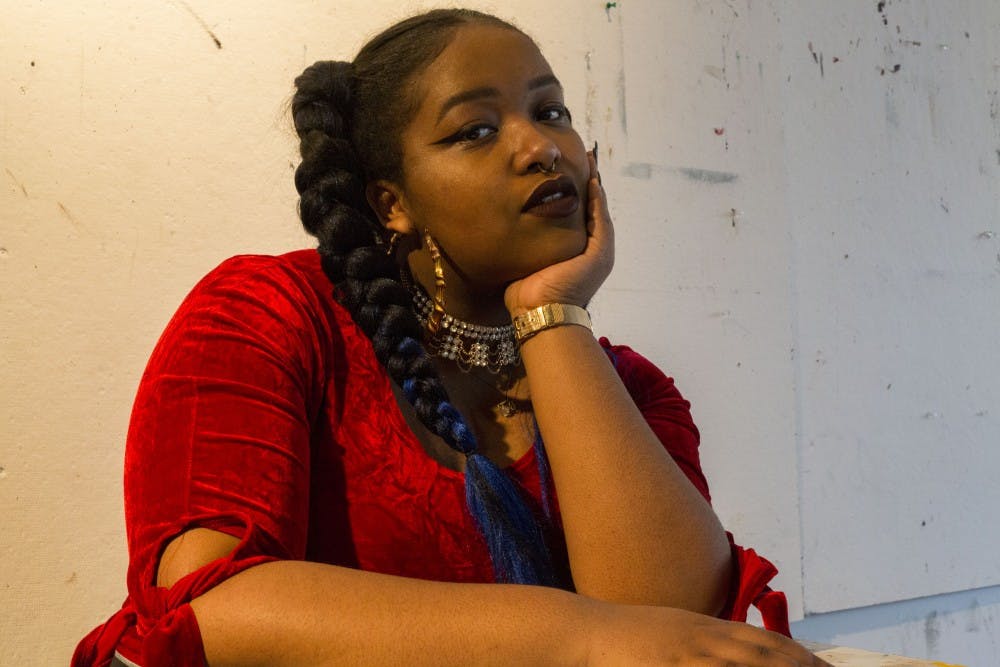Eva Lewis (C' 21) is all about her activism. And she's busy. At just 19, this Questbridge scholar has already been more active in politics than most full–grown adults. She started The I Project in 2015, which she calls her “baby.” It’s “an initiative to humanize youth affected by intersectionality through an activism by arts approach through community outreach.” She also started Youth for Black Lives after she and three other girls held a protest in Chicago with 3,000 people present. Their aim was “to amplify the voices of black youth.” The group is also entirely run by black femmes—something Eva is very proud of.
Eva was also invited to do a talk for TEDxTeen. She recounted the experience to me—“I was called...ten days before the TEDx Talk was gonna happen.” She explained that at that time, she was already missing school for the Obama Foundation summit. She got the call the morning of the summit. “I was really shook...I [had] no time,” she said with a grin. Most of her correspondence was with Jess Teutonico from the We Are Family Foundation (the group who put on TEDxTeen). When Eva asked if her 18–minute speech had to be edited, she was met with a “yes preferably.”
“[It was] so stressful...First of all, I came back from Chicago and caught a virus...I couldn’t look at screens.” Though she was so ill at the time, she said it was still “the best thing that ever happened.” She went on to explain that she felt like she "could really focus on [her] narrative.”
So she wound up writing a poem grounded in her cousin's experience with a bullet being shot in her window on the South side of Chicago.
“I remember for so much of last year [my cousin] was so humbled.” She said that having a bullet that close to her head made her cousin think more deeply and Eva thought more deeply, too. To open her TED talk, she decided to “personify the bullet” in the poem and explore what it means to be the person behind the bullet within the context of her personal narrative. The rest of the Ted Talk was “just [her] story.”
After hearing about all that she’d done, I asked how she balanced school life and activism. She said that she had been “by the grace of god, truly.” She also said that going to “the number one public school in the United States...taught [her] time management.” She was, and continues to be, very intentional about her schedule. She also credits two friends she has in Chicago who are doing wonderful things for her “baby,” The I Project.
What got this powerful young woman into activism? To answer this, she spoke about her first protest. “The first protest I went to was one for Trayvon Martin...I realized what it was to be on the forefront of something.”
Being at the forefront of a movement, though, comes with a lot of media attention. “It’s exciting,” says Eva, “with eyeballs come opportunity.” She let out a chuckle. The media also gave her a “powerful platform” in terms of access to both mentors and peers. She said that “mobilizing people our age is always powerful.”
This quickly developed into a conversation about black identity. She said, “being black is such a paradox because there is such a beauty in being black…[people think] how can I copy them...everyone kind of wants to be you….” She said that we as black people in America are “defining pop culture.” She talked about the “fine line between owning [her] culture and being commoditized.”
Her head was hung low and shaking slowly from side to side. “It’s really hard being the most oppressed subset...to be a queer black femme?” She took a sharp inhale.
I asked Eva what BLM means to her. She paused before responding, “Black Lives Matter is just a fact, it’s not up for debate.”
She reminisced about how BLM seemed to begin. “It really started with Ferguson...all you saw was media blackout [when it happened]…the public had gotten to a certain threshold, we were just getting poor quality videos of what was happening on the ground.” Around the time of the tragedy, she was only about to be a sophomore in high school. It was then that she thought “I have to do something. I have to start speaking.” It hit her close to home. “Some people were stuck in their homes” due to the chaos outside. Why? “Because white people are white people–ing again and systems are system–ing again.”
She aims to change the way those systems work. “I speak about this scaffold I want to create in terms of my hood in Chicago. I want us to be able to eat, learn, live, love, and anything under the UN Declaration of Human Rights. I want that for everywhere...especially where there are black and brown bodies.” She’s taking a hands–on approach to building that scaffold, starting with education equity. She’s pursuing change with vigor and says she’ll do it “by any means necessary.” Her purpose at Penn is to learn—“cultivate [herself] here so [she] can cultivate others.”
“We have the means to educate more people...and [we are] actually striving for our needs to be met.” Her voice in that moment was full of passion as she went on to say that “we cannot operate within the system, we need radical change.” She encourages allies to “step up.”
Eva Lewis is demanding that we “press play on the revolution.”

